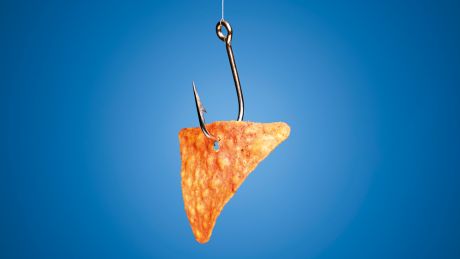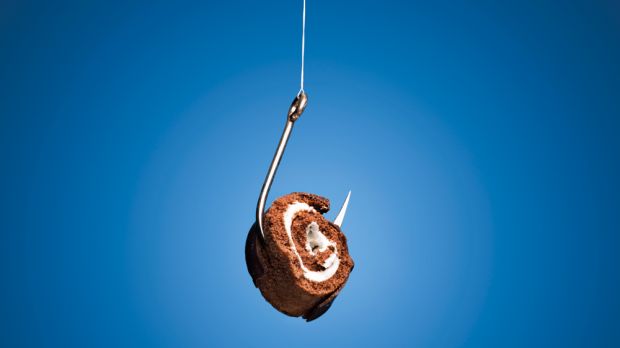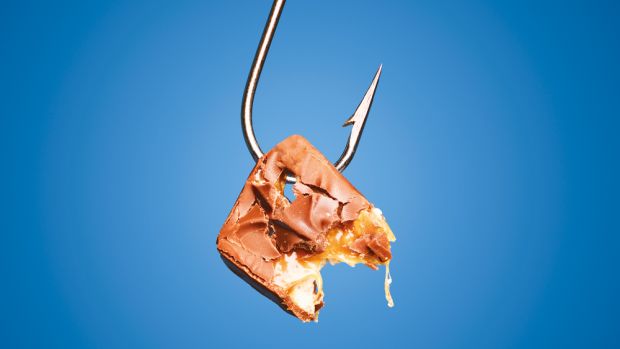Are You Hooked On Junk Food?
You might be eating more junk food than you realise because it isn’t just bad for you, it’s actually designed to make you keep eating it

In case you don’t understand just how bad junk food is for your body, there’s a simple study known as the Cafeteria Diet that makes it clear. In an attempt to accurately measure food intake in a group of ten lean, healthy men, researchers filled two vending machines with pancakes, cheeseburgers, French toast, margarine, cakes, puddings, apples, jelly beans, Doritos, M&Ms and fizzy drinks, among other things. Then the volunteers were allowed to eat as much as they wanted for seven days, with no other foods available.
The results shocked even the researchers: the men immediately started eating, on average, 1,544 calories a day over and above their previously determined energy needs, roughly a 60% increase for most of them. Over the course of a week, each man gained an average of 2.3kg.
Global and domestic obesity rates are soaring. According to a 2016 study published in the Lancet, one-fifth of adults worldwide will be obese by 2025, with the UK topping 38% to make us the fattest country in Europe. At the same time, we’ve never had more information about the food we eat: an EU requirement to provide a “nutrition declaration” including fat, carbohydrate, sugar and protein content on food packaging came into force in December 2016, and cafés and restaurants increasingly provide calorie counts and other info to help us when ordering. We know what we’re eating; we just can’t stop. But why?
Best possible taste
The problem starts with the arms race of taste. Food companies spend millions experimenting to find the perfect level of crunch in crisps or fizz in soft drinks, but they’re also looking for the perfect combination of salt, sugar and fat to excite your brain and keep you coming back for more.
They use sensations like “dynamic contrast” (the combination of crunchy shell and creamy centre that makes custard creams so moreish) to keep you eating, and pair them with “vanishing caloric density” (foods that “melt in your mouth” to signal your brain that you’re eating less than you actually are) to stop you feeling full.
They design foods to provide enough taste to be interesting, but not so much that your senses are dulled, and use glazed and emulsified foods to kick-start a salivatory response that sets you up for binge eating.
This creates what have been called “hyperpalatable” foods – ones that it’s easy to overeat even once you’re full. And while it’s technically possible to include them in your diet without going over your daily calorie and macro count, it’s not easy.
Get the Coach Newsletter
Sign up for workout ideas, training advice, reviews of the latest gear and more.
“Any diet plan can work for the short term, when motivation is high – for an upcoming event or beach season,” says fat loss expert Nate Miyaki, author of The Six-Pack Checklist. “But it’s virtually impossible to stay in the relative calorie deficit necessary for fat loss if you’re making mostly poor food choices.”
This is where calorie counting and the If It Fits Your Macros approach (eat anything as long as it’s in the desired ratio of protein, carbs and fat) fall apart. Over-processed, hyperpalatable foods either have no effect on your hunger hormones or actively confuse them, making you constantly hungry, anxious and miserable.
You might technically be able to live on 2,000 calories’ worth of ice cream and pizza a day and still hit a 40/30/30 split of protein, carbs and fat, but if it makes you feel sluggish and morose, it’s not going to be sustainable.
Things get even worse when trans fats come into the picture. Our brains rely on natural fats for numerous processes, but these highly processed artificial ones can reduce serotonin production, adversely affecting mood and memory. At some point, the bingeing’s going to start –and that’s not even the biggest problem.
Hunter slatherer

The real issue with junk food is that its effects don’t stop when you leave the table or put down the packet. To understand it, you first have to get your head around your brain’s reward system, which gauges how “desirable” foods are, then motivates and reinforces behaviour patterns that involve going out and getting more of them.
Eat cottage cheese for the first time, for instance, and you might not enjoy it, but once it’s been digested and your body “understands” that it’s full of calories it’ll start to taste better and better.
The problem? When we were living in caves or trying to find calorie-dense sources of food in a natural environment, this worked great, but now our reward system can be horribly thrown off by modern food combinations.
It’s attuned to calorie density, fat, sugar, salt and crunchy or easily-chewed foods – as well as drugs including alcohol and caffeine. Every taste is an acquired taste to some extent, but some tastes are easier to acquire than others, and processed foods take advantage of this to get you addicted.
And the system is self-perpetuating. When you eat something tasty, your brain registers the feeling, and seeing that food again (or even just thinking about it) triggers the same responses that came when you ate it, making you salivate and crave those foods.
Eventually, you’ll go out of your way to find these “rewarding” foods, not because you’re hungry or thirsty, but because you’ve conditioned yourself to like them.
It gets worse. In a 2010 study published in the journal Nature Neuroscience, researchers monitoring the brains of rats given a junk food-heavy diet found that the rodents’ dopamine receptors declined as they overate, meaning that they needed to eat more bad food to get the same reward sensation.
A 2001 study in the Lancet saw similar effects in the brains of obese people, alongside those hooked on cocaine or alcohol. The conclusion? The more junk food you eat, the more you need to get the same buzz.
Some nutritionists and scientists conflate the two effects, but hyperpalatable and hyper-rewarding foods are actually quite different. Palatability is about how much you enjoy your food as you eat it, as opposed to how likely you are to seek it out again. Foods that are hyperpalatable also often cause reward-seeking behaviour, but clinical studies suggests their effects are separate, since they trigger different chemicals in the brain.
Hyperpalatable foods kick off your brain’s opioid signalling systems, reminding you that you’re enjoying them. Rewarding foods give you a jolt of dopamine, sometimes known as the hunter-gatherer hormone – the same one that kicks in when you get a notification on your phone and keeps you chasing rewards on Candy Crush.
Not all rewarding foods are bad, but when hyperpalatable foods are rewarding – which the most popular processed junk foods are – you’ve got a food that you’ll seek out and then overeat. It’s a killer combination.
Refine your diet

So what do you do about all this? The first step is to avoid addictive foods whenever you can. “Cut back on highly refined, processed and hyperpalatable foods,” says Miyaki. “This includes refined carbs and refined fats, and especially fast and packaged foods that combine both.”
Make healthy substitutions where you can, but that doesn’t mean replacing sugar with artificial sweeteners. “They’re not a healthy alternative to sugar because they have been found to promote sweet cravings,” says nutritionist Sally Temple of Nuffield Health. “They’ve also been linked with an increased risk of developing type 2 diabetes.” Drinking unsweetened coffee might be tough for the first few weeks, but it’ll get easier.
The next step, as with any addiction, is to avoid relying solely on willpower to fix it. “Start with a kitchen makeover,” says Myles Hopper, a coach at Precision Nutrition and co-author of Mindful Chef. “In order to be the best possible version of yourself you need to surround yourself with good stuff. This includes your kitchen. Get rid of all processed foods – including cereals, flavoured yogurts, snack bars and fruit juice – and fill your kitchen with vegetables, fruits, proteins, nuts and wholegrains. You’ll be surprised what a difference it will make not having junk food in the house to tempt you into eating poorly.”
RECOMMENDED: Learn How To Cook Simple, Healthy Recipes With Chef Adam Grey
At the very least, keep the bad stuff in cupboards: you’ll avoid the dopamine spike that comes from glancing at a box of Crunchy Nut, as well as the resulting temptation to binge.
From there, focus on habit change – but think proactive, not reactive. “By setting yourself behavioural goals you will be far more likely to achieve health goals,” says Hopper. “Goals like making yourself breakfast or lunch every day will stop you heading out to grab a packaged sandwich. Doing a weekly shop and making sure your house is full of good food for the week means you won’t be relying on anyone else for a healthy meal. If you’re ready to upgrade this, aim to block out an hour once a week to prepare your food for the next seven days.”
The next step is to take your healthier habits on the road. “If you’re eating out, try to pick better options,” says Hopper. “On the menu look out for protein and vegetables, with the aim of eventually ‘retraining’ your brain to direct it away from options like pasta with heavy sauce, just like a vegetarian won’t look at the meat courses. And if eating at home is getting too tough – perhaps you don’t have the time to shop or simply don’t know how to cook – try a delivery service.”
Time to make a change
The most important key to success? Don’t beat yourself up if you weaken. Habits are hard to break, and food habits are some of the hardest of all. Your friends, your work colleagues and your caveman brain are all likely to be working against you, as is the food-industrial complex that finds it easier to monetise crisps than broccoli. Sugar is cheap and addictive, and advertising tells you to eat foods that can be trademarked, not ones that grow on trees.
If you’re addicted to junk food right now, you’re unlikely to break that habit today, or even in a week – but it’s worth breaking. So clean out the fridge, learn a couple of simple recipes, order your coffee with nothing in it, and get on with kicking the habit. Because once you do, everything else will be easier.
From 2008 to 2018, Joel worked for Men's Fitness, which predated, and then shared a website with, Coach. Though he spent years running the hills of Bath, he’s since ditched his trainers for a succession of Converse high-tops, since they’re better suited to his love of pulling vans, lifting cars, and hefting logs in a succession of strongman competitions.

